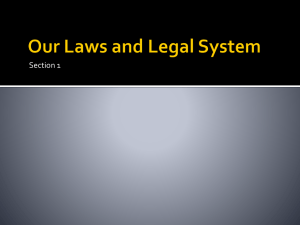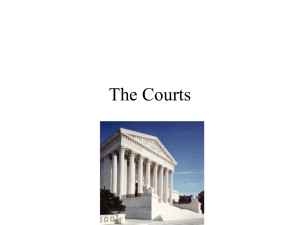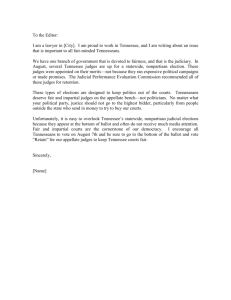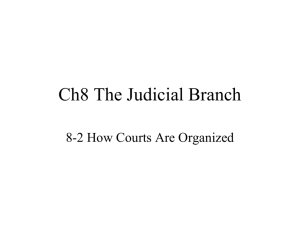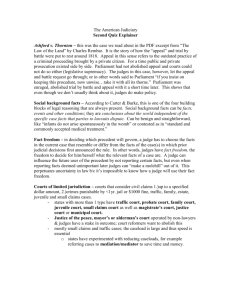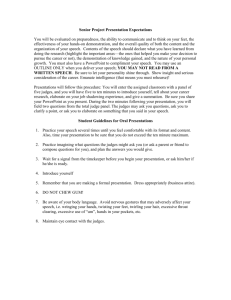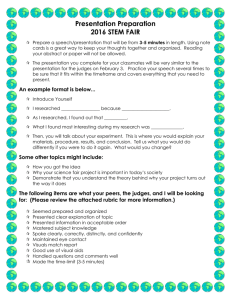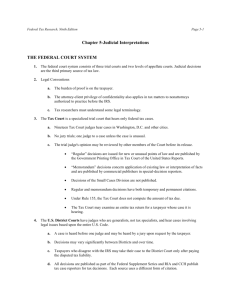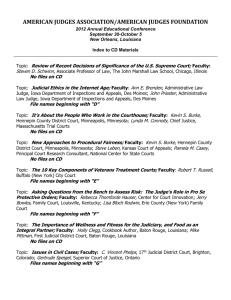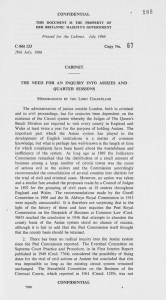Common Law
advertisement
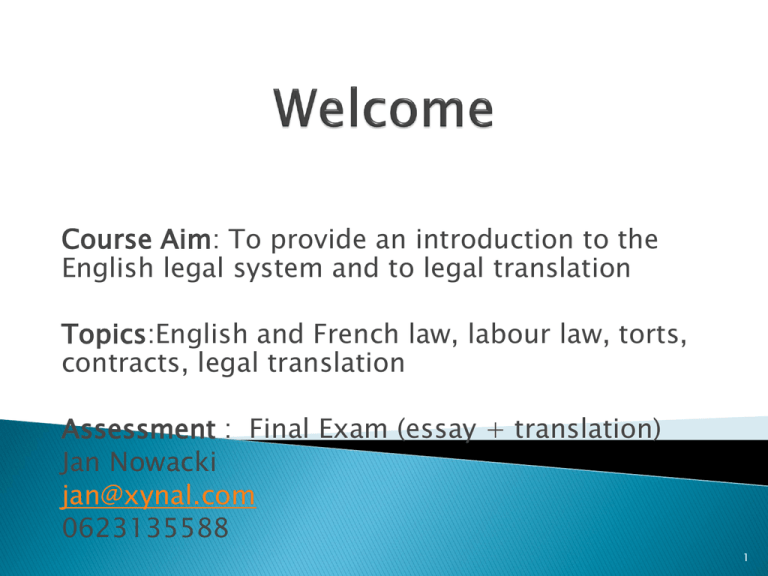
Course Aim: To provide an introduction to the English legal system and to legal translation Topics:English and French law, labour law, torts, contracts, legal translation Assessment : Final Exam (essay + translation) Jan Nowacki jan@xynal.com 0623135588 1 Wk 1 History of Common Law Wk 2 Comparison to French law Wk 3-4 Labour law Wk 5-6 Torts Wk7-8 Contracts Wk9- Case Study Wk11- Review Wk12 – Final Exam 2 The Council of Europe French- English Legal dictionary 1994 Bouscaren, C., Greenstein, R., Les bases du droit anglais 1993 Dhuicq,B., Frison, D., L’anglais juridique 2008 Dhuicq,B., Frison, D., Dictionnaire de l’anglais juridique 2008 Shears.P., Stephenson G., James’ Introduction to English Law 1996 Smith, K., Keenan,D., English Law 3 Legal system of England and Wales only – “the laws of England and Wales” from1967 Basis of most legal systems in the Commonwealth, the US ‘England’: Statutory Framework: -Great Britain (England, Wales, Scotland) - United Kingdom (Great Britain & Nth. Ireland) - British Islands (UK, Isle of Man, Channel Islands) 4 Common Law vs Civil Law: no major codification, judicial precedents binding, not persuasive Common Law: made by judges in court applying knowledge and common sense of legal precedent to the facts presented Can be amended by Acts of Parliament, European Court of Justice 5 Evolution of pre-Common Law: Ethelberht: Dooms (judgments) of Kent ‘in accordance with Roman precedents’ (Beda) Ine : publishing Laws of Wessex (c.690) Ordinance of Alfred (c. 900) Code of Canute (1035) Dooms of Canute the Dane most comprehensive statutes of the 11th Century Distinguish between law and right Dooms are distinct from Canon Law 6 Justice primarily through canon courts presided by religious and lay judges Anglo-Saxon tradition’ king as protector of the realm, corrector of wrongs’ Development of Shires, Counties and Hundreds ‘Personal Laws’ evolving into ‘Local Customs’ into customary laws 7 Battle of Hastings Merging of Frankish and Anglo-Saxon Law English Law as offspring of Frankish Law - Early texts in French, private law technical terms of French origin -Domesday Book :importance of taxes Legis Henrici Primi (c.1115) comprehensive law-book by Glanvill 8 Changes Implemented Began sending judges from central court Emergence of unified court system and stare decisis, emergence of common law Henry II vs Thomas Becket who has greater authority? - what to do about bastards (1230)? Angevin Legal reforms: 1.Royal legislation: Assizes (Clarendon 1166, Northampton 1176 ) 2. beginning of travelling Royal Justices( circuit judges) 3. Creation of Juries 9 “Inquiry shall be made throughout every county and hundred, through 12 of the more lawful men of the hundred and 4 of the more lawful men of each village upon oath...whether there be... Any man accused or notoriously suspected of being a robber or murderer or thief. All accused by the presenting juries were to be put to ordeal of water...” Professor John Hudson 15/10/2010 bbc.co.uk 10 1.Assize of novel dissein: - Recent dispossession of land 2.Assize of mort d’ancestor: - Disputed inheritance - Royal Writ sent to Sheriff to form a jury - Traditional approach ‘who had the greater right to land?’ - New approach: fast and focused on specific issue, with clear procedure - Law now protected tenants from landlords by appealing directly to the King 11 Emerged from adaptation of Writ System to meet everyday needs Casuistry or Case-based reasoning Applying common sense and precedent Need for a body of internally consistent law Evolving system eg. Pie Powder Courts (“pied poudrés”) to Law Merchant Precedent or Stare Decisis : need for standardised procedures and predictable outcomes. Decisions in Supreme Court are binding and overrule all others. 12 Signed by King John under duress End of 150 years of harsh Norman Penal code First House of Commons( Runnymede,1215) Thomas Macaulay “ Then it was that the common law rose to the dignity of a science and rapidly became a not unworthy rival of the imperial jurisprudence” (History of England) Consolidated in 1297 13 ‘No Freeman shall be taken or imprisoned, or be disseised of his Freehold, or Liberties, or free Customs, or be outlawed, or exiled, or any other wise destroyed; nor will We not pass upon him, nor condemn him, but by lawful judgment of his Peers, or by the Law of the land’ Domesday Book Origins aren’t clear 14 Professionalising of judges, closer attention to forms Growing awareness of limits of common law Writ System Remedies (money) Procedure Defences and Corruption Trusts and Mortgages ‘Equity of Redemption’ Equity ‘to mitigate the rigor of common law’ 15 Chancellor judges cases ‘in light of conscience and fair dealing’ (Smith and Keenan) Chancellor issues a subpeona to attend Westminster courts Conflict between clerical equity and lay common law 1873-5 Courts of Law and Equity combined, equity supreme 16 1. 2. 3. 4. 5. 6. The agent’s non-performance of the terms and conditions led to a discharge of the contract The plaintiff had wanted to waive his rights but the other party insisted that he should carry out his obligations. Infringement of public policy provisions can cause the agreement or parts thereof to be rendered nul and void Freedom of contract is the right to choose whether or not to enter into a contract and to draw it up in a way in which each of the contracting parties thinks fit When a contract is enforceable the courts will lend their aid to the enforcement of the agreement Au-delà d’un certain laps de temps, aucune des parties ne peut intenter une action sur le contrat 17
